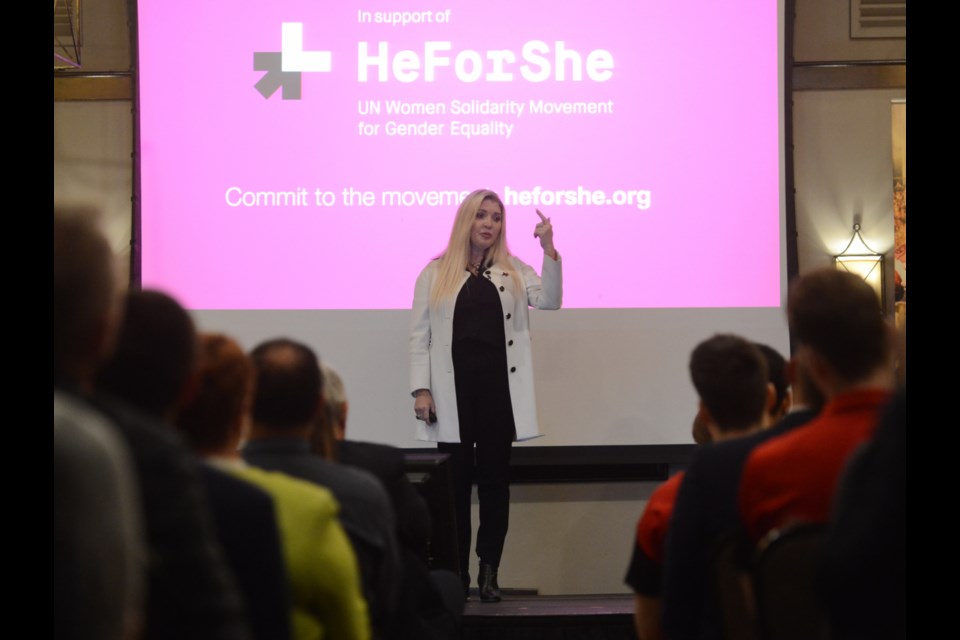Action, not words, will create a better world when it comes to striving for gender equality.
That was one of the messages Lisa Lisson brought back to her alma mater Wednesday, speaking at a HeForShe event at Cutten Fields.
HeForShe is a United Nations-initiated campaign aimed at promoting gender equality and solidarity to create change in the fight against negative gender-based stereotypes and behaviours.
Lisson, who graduated from the University of Guelph 28 years ago, is the president of FedEx Canada and he author of Resilience: Navigating Life, Loss, and the Road to Success, which details her rise to the top of the corporate world while dealing with tremendous personal loss.
“We have been making progress, but it’s not enough,” Lisson said of gender equality, speaking to a room of roughly 150 people.
“This is not just a women’s issue, it’s a global human rights issue and we cannot just stand on the sidelines. We need to stand together in solidarity and commit to taking action and commit to any way we can to make a difference.
“It’s one thing to take part in the conversation, it’s another thing to make action. Any action, any movement, is more important than no action at all.”
“We are making progress, but we’ve got so much more room to grow,” Lisson said.
She spoke about a 2018 report that shows how under-represented are on the corporate level.
It showed that 34 per cent of all management positions occupied by women and only 8.5 per cent of CEO or president positions.
“And that’s 2018,” Lisson said for emphasis.
On a positive indicator of change, she said that another study shows that there are no all-male boards of directors at the top 100 companies in Canada and “it’s the first time they’ve seen that ever.”
More women running in politics, a gender-balanced cabinet in the Federal government, more companies putting in executives and programs aimed at increasing the diversity and inclusion within their companies are other positive signs.
“Socially diverse groups are far more effective and innovative. Diverse companies perform better that those that aren’t,” Lisson said. “They can generate ideas and perspectives that may not otherwise have ever been seen … research has proven it.”
Lisson graduated from the U of G’s commerce/marketing program then researched companies to find one where the corporate values best matched her own.
Settling on FedEx, she, delivered her resume personally to a company executive, sent that executive flowers the next day, then was hired in the marketing department..
Working her way up the corpoate ladder at the company that employs almost 6,000 people in Canada. Eight years ago she was named president.
Along the way she overcame loss.
Lisson lost her husband Pat to a heart attack that left him on life support for two years before he died and before that her father died at 47 while she was still a student at the U of G.
Being named president of FedEx happened a year after her husband's death as she was raising their four children alone.
During a Q & A session following her address, Lisson was asked about gender bias she might have seen in her career.
She responded with story about a corporate meeting a number of years ago when she was vice-president of finance at FedEx Canada.
She and another top male executive were in a room for an important meeting with a client when that client entered and looked at her.
“I’ll have a coffee,” the man said to her, assuming she was some sort of assistant to her male colleague.
“Me too. I’m Lisa, the vice-president of finance, pleased to meet you….” she responded.
Wednesday’s event at Cutten Fields was presented by the University of Guelph football program.
In introducing Lisson, Gryphon football player Lukas Brennan spoke of the concept of “toxic masculinity” and said the HeForShe movement is something all men should support.
“As football players it was easy for us to be associated with toxic masculinity because of the nature of our sport. We are required, on the field, to be ultra-aggressive and persuasively dominant over our opponent in order to have success,” Brennan said.
“I denounce any concept of toxic masulinity simply because I disagree that any of this behaviour even deserves to be associatied with the word masculinity whatsoever.
“Maculinity can be multitude in a multitude of ways, however sexual objectification and violence is simply deviant behaviour and should not be associated with masculinity in any circumstance.
“Supporting HeForShe movement can help us, as football playes, start to reject the stereotypes of toxic masculinity and let the rest of the campus know that we support women in their fight for equality.”
